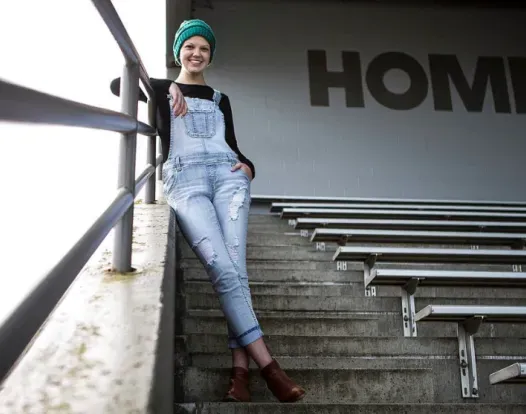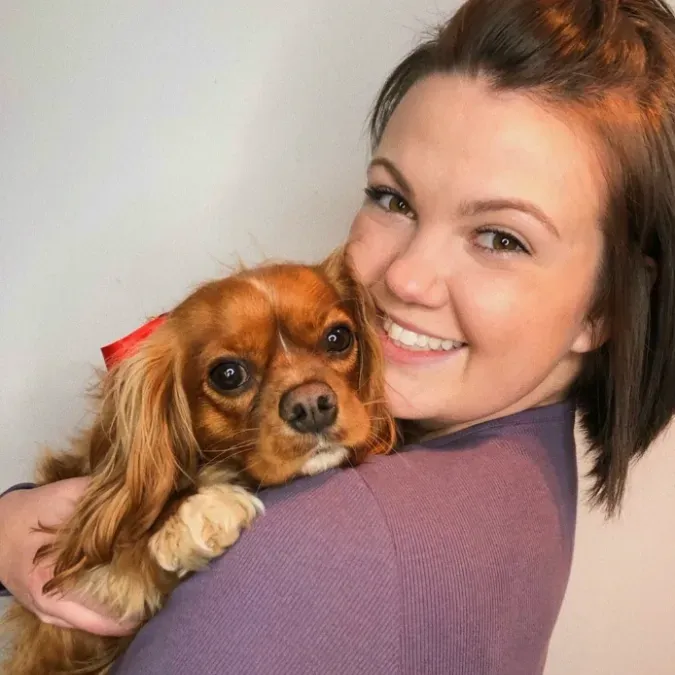The Story of Emma
Coming Back from Cancer: How Emma Learned to Love Life Again

After a cancer diagnosis upended Emma’s life, her oncologist’s focus on resilience helped her get through the darker days to find joy in living each day.
Before the itching started—and then the tedious search for answers—Emma remembers her life as that of a happy, typical teenager.
She had her whole life ahead of her. She was cheerleading captain and homecoming princess. She participated in theater and had a scholarship to play softball at Western Washington University.
But then came a series of worrisome symptoms, eventually leading to a cancer diagnosis. And that diagnosis, along with the recurrence that followed, reshaped Emma’s life.
"It's funny looking back," she says, recalling her happy, typical teenage years before everything changed. "I am just such a different girl today.”
With help from her oncologist, Conquer Cancer-funded researcher Dr. Molly Taylor, Emma faced her treatment head-on and found herself on a journey of resilience, self-discovery, and ultimately, a powerful comeback during which she learned what it meant to love living once more.

The Struggle Behind the Story: Young People, Cancer, and the Necessity of Resilience
To truly understand the story of Emma—and countless patients like her—you first need to know something important about pediatric patients with cancer: They face a significantly higher risk for depression and other mental health disorders. It's a reality that bears out in statistics. According to one 2023 study published in the Journal of the American Medical Association, an estimated 40 percent of childhood cancer survivors go on to experience depression. Another study, this one in the Journal of Pediatric Psychology, found that 75 percent of children with cancer will experience PTSD during or after treatment.
“We have known for a long time that physical and mental health are connected,” Dr. Taylor says. “If we can understand how stress is related to the development and trajectory of disease, we can develop better ways to support patients and families throughout their cancer experience.”
A graduate of the Geisel School of Medicine at Dartmouth College, Dr. Taylor also has an undergraduate degree in psychology—an area of interest that ultimately informs her oncology research. A Conquer Cancer grant recipient, her research focuses heavily on the psychosocial impacts of cancer on pediatric patients, particularly the relationship between stress management and resilience.
“There’s a lot of debate in our field about what resilience is and whether it means working toward this end goal—which is to be a resilient person—or whether it’s the process or the mode by which you get through difficult circumstances,” Dr. Taylor says. “I think I fall more in the latter camp, and that it’s a dynamic process that really does look so different for everyone.”
What resilience does not mean, she continues, is the absence of hard days. “Resilience isn’t a total suppression of the very real stress and trauma and difficulty that comes with something as crazy hard and complicated as cancer,” Dr. Taylor says. “Just because you’re having a tough time doesn’t mean you aren’t a resilient person.”
As it turned out, Emma was going to need all the resilience tools she could get.
The Cancer Diagnosis: Shock, a Pounding Heart, and a Whole Lot of Nothing
The itching started during a summertime cheerleading camp, just a few weeks before her 18th birthday. “And it wasn’t just a scratch here and a scratch there,” Emma says. “I was itchy all over my body, from inside my ears to in between my toes, constantly.”
It got so bad, she recalls, that her parents eventually brought her home from camp early, convinced she’d been exposed to bedbugs. But even after a round of bedbug treatments, Emma kept itching.
The next stop was a dermatologist, who diagnosed Emma with eczema. But after six months of eczema treatments, the itching persisted. Perplexed and thinking perhaps her symptoms stemmed from liver or kidney problems, Emma’s dermatologist ordered a chest X-ray and blood work.
Not long afterward, the phone call came: Emma’s chest cavity was riddled with tumors. She had Hodgkin’s lymphoma.
“I feel like Hollywood actually gets this moment pretty darn right,” Emma says. “The world around you kind of slows down, you get tunnel vision, maybe a little dizzy. The only thing you can really hear is your breathing and your heart rate.”
She remembers falling over and her brother catching her. She remembers everyone crying and the panic that permeated the atmosphere. But in the hours immediately after that, she remembers feeling nothing. “Looking back, it was the start of a panic attack, which I think is a valid reaction in a moment like that. But the initial first moments were just a lot of nothing, a lot of heartbeat, a lot of breathing until I was able to come out of the initial shock.”
Once the shock did wear off, she says, it was time to get down to the business of treatment and recovery. A Washington state-native, Emma and her family were referred to Seattle Children’s Hospital, where she was introduced to pediatric oncologist Dr. Molly Taylor. Eventually, following four rounds of chemotherapy, Emma was declared cancer-free.
Her cancer journey, however, was just beginning.
A Second Cancer Diagnosis and a Triumphant Comeback
With cancer seemingly behind her, Emma tried to get back to her life. But, she says, she was in a dark place. “I didn’t really leave the house much. I didn’t really go outside,” she says. “I didn’t really see people, didn’t really move my body.”
Once an avid singer, treatment had taken a toll on Emma’s vocal cords. She was no longer captain of the cheerleading squad. While her teenage life stood still for cancer treatment, her friends’ lives continued moving forward. Meanwhile, her college plans were in jeopardy: having developed neuropathy in her hands and feet, her college softball scholarship fell through.
“I struggled pretty severely with depression,” she recalls. “And I had a really hard time climbing out of that.”
Emma was at a loss. But what she and her parents did know was that she needed to get out of Seattle. “It just had too many haunted shadows for me,” Emma says.
Ultimately, she chose Washington State University—just far enough to feel like a fresh start, without forcing her to pay out-of-state tuition. And, as she kicked off her freshman year, life seemed to turn around. The cloud of cancer that previously loomed overhead seemed to dissipate. She found new hobbies. Best of all, she made a group of new close friends who, even today, she credits with helping her reenter the world.
The timing couldn’t have been better: Seven months into her freshman year, Emma found herself back at Seattle Children’s and back in the care of Dr. Taylor. Her cancer was back.
Alongside these new friends, Emma went into this diagnosis armed with something else new: knowledge, experience, and a keen understanding of what was coming. As a result, she says, she also had a heightened degree of resilience that would ultimately see her all the way through treatment until she was cancer-free once more—a day that came in August 2019.
“If you’re going to relapse,” Emma explains, “there’s only one positive: You know how to do it better this time. I knew that, for me, peppermint was super helpful for nausea. I knew lemon drops were nice to suck on while I’m getting my port flushed or having chemo because it would cut through that metallic taste. I knew I needed hobbies and things I could do from bed that would keep me entertained and my mind stimulated. I knew I needed more social support.
“The only other benefit to having cancer twice is that it does convince your parents to get you a puppy,” says Emma, now five years cancer-free and about to complete her doctoral degree in occupational therapy. “It is super, super helpful in that department.”
Meanwhile, the resilience she gained—and the strategies for cultivating it—remain ingrained within her. “I remember one day, I was sitting through chemo reading a book, and I was having a particularly bad day,” Emma recalls. “And I read a chapter with a line that has stuck with me ever since: It said, ‘Don’t let the bad days win.’ You can have good days. You can have bad days. But it’s about not letting those hard days win."
See also:
Meet the Researchers: Molly Taylor, MD, MS, Works To Make Cancer Treatments Less Stressful for Young Patients
Using support from a 2020 Young Investigator Award, Dr. Taylor is testing a resilience-building program for young people with cancer, exploring how mental, behavioral, and environmental factors interact with the immune system to affect patient outcomes.
Your Stories Podcast: The Comeback: How Emma Learned to Love Life Again
In this episode of Your Stories, Emma joins her oncologist, Conquer Cancer-funded researcher Dr. Molly Taylor, for a candid discussion about resilience, recovery, and what helped her make a major comeback after facing cancer twice.
